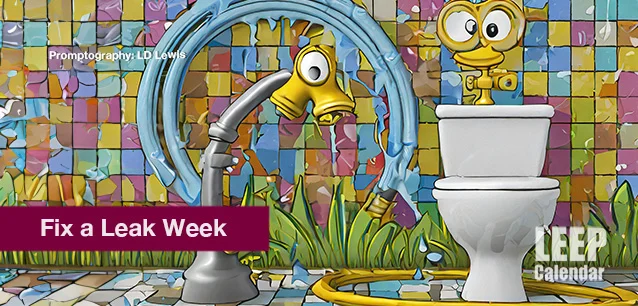 AD
AD
Today is: November 24
Scroll to explore events active on this date.
Additional Events on LEEP
LEEP INK FEATURES

August is Appropos
A toddler playing in the fountain at a park in Santa Fe, New Mexico—Photo LD Lewis. In August, we live through the Dog Days of Summer. It's hot and often humid, and those ...

September is Sassy
Can you hear that sigh of relief from parents worldwide? Yes! September marks the return of students to school, a global phenomenon. Preparations for the ACT and SATs begin earnestly for ...

OOH LA LA, October
October is the busiest month for events, with 5% more happening than in May, the second most eventful month. Sailing enthusiasts will be glued to the finals of this year's Am...
About Fix a Leak Week
Retail , Safety & Security
United States
Ends: Mar 24, 2024
DESCRIPTION:
Fix a Leak Week, an initiative by the U.S. Environmental Protection Agency (EPA), is part of the agency's WaterSense program, aiming to raise awareness about the importance of fixing household leaks. This annual event, typically observed in March, focuses on educating homeowners and communities about the significant water waste caused by leaks and the simple steps they can take to conserve water.
The history of Fix a Leak Week dates back to 2009, when the EPA launched the event as part of its WaterSense program to promote water efficiency and conservation. The program addresses a critical issue: more than one trillion gallons of water are wasted annually in U.S. homes due to easy-to-fix leaks. The week-long event has since become a vital component of the EPA's efforts to encourage water conservation at the household level.
During Fix a Leak Week, the EPA and its partners provide resources and tips to help homeowners detect and repair leaks. Common areas where homeowners should check for leaks include:
Toilets: Often a significant source of water waste, toilets can have silent leaks. Homeowners can check for leaks by placing a few drops of food coloring in the toilet tank and waiting 10 minutes to see if color appears in the bowl.
Faucets and Showerheads: Worn-out rubber washers and gaskets frequently cause drips in faucets and showerheads. Checking and replacing these components can fix these leaks.
Outdoor Faucets and Hose Bibs: Seasonal changes can cause outdoor faucets and hose bibs to leak. It's essential to check these, especially as the weather warms up.
Irrigation Systems: Homeowners should inspect their irrigation systems each spring to ensure they aren't damaged by frost or freezing.
Under Sinks and Supply Lines: Checking for moisture or drips under sinks and around the supply lines to appliances like dishwashers and washing machines is also crucial.
The EPA also encourages local communities and organizations to get involved by hosting events, workshops, and challenges to spread the message about leak detection and repair.
Fix a Leak Week is more than just a campaign; it's a call to action for every household to play a role in water conservation. By fixing household leaks, homeowners can save water, reduce utility bills, and contribute to a more sustainable and environmentally friendly use of vital water resources.
VIDEOS
SUPPORTING DOCUMENTS
Currently, this event does not have supporting documents.
ADDITIONAL IMAGES
Currently, this event does not have supporting images.
Where would you like to go now?
 AD
AD


/footer-logo.svg)
